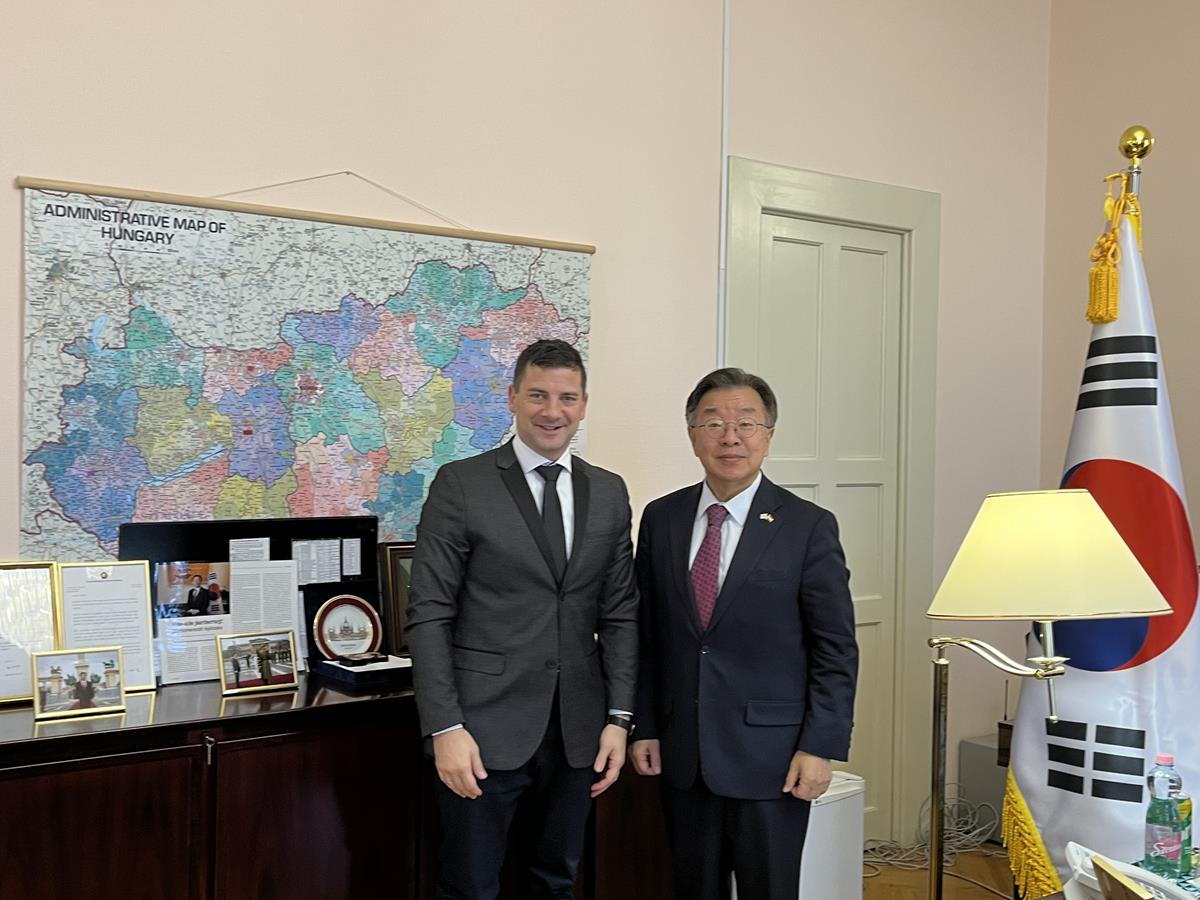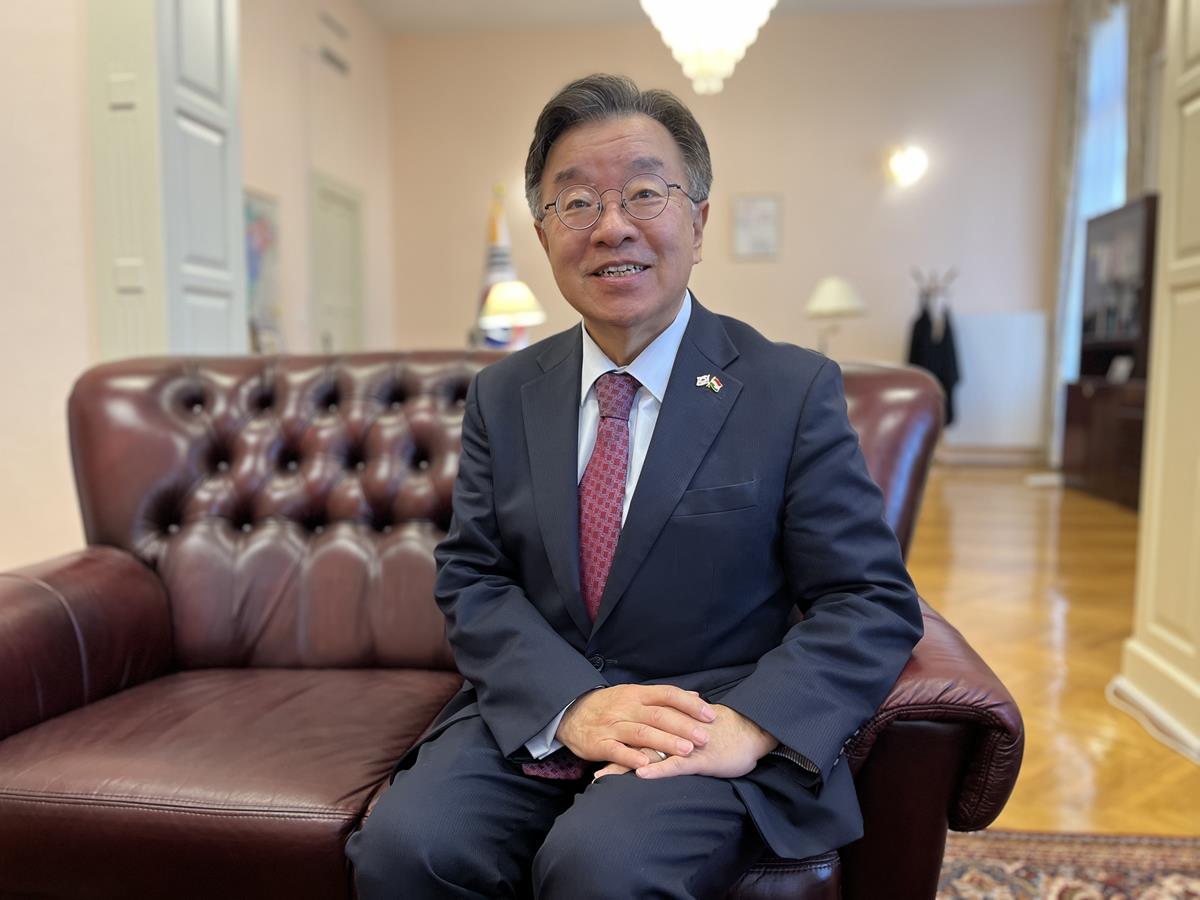Change language:
Interview with South Korean Ambassador Hong on foreign policy, investment in Hungary and more

Our latest interviewee is His Excellency Dr Hong Kyu Dok, Ambassador of South Korea to Hungary. During the interview, we discussed the situation in North and South Korea, Korean investments in Hungary and many other topics. Read the first interview of the year:
Daily News Hungary (DNH): Having lived in Hungary for quite a while, could you tell us a bit about your experience? What characteristics stand out about the Hungarian people, and how would you describe life for a Korean national in Budapest?
Ambassador Hong Kyudok: I have been living in Budapest for about 11 months now. I feel grateful and am always amazed by the way Hungarians greet me and my wife. I am so delighted that many Hungarians have shown their great interests in Korean culture. I sincerely thank them from the bottom of my heart. The Korean population living in Hungary has increased rapidly. Currently, we have almost 7,000 Korean nationals living here. If we include the 90-day visa waiver holders, the number goes up to more than 10,000. They enjoy being here. The safe environment is the thing they like most, and friendly attitude toward Koreans are remarkable. Compared with densely-populated Seoul, many people from Korea think that life here is pleasant and happier. Your culture that respects the elderly and family remind me of Korea in old days, and we feel at home since we have many commonalities.
DNH: South Korea is a major investor in Hungary, consistently ranking in the top three and employing tens of thousands of people. What do you believe is Hungary’s allure? Why do so many Korean companies come here?
Ambassador Hong Kyudok: About 310 Korean companies are investing in Hungary and many more are interested in coming to Hungary. You may wonder why. Your policy incentives including low corporate tax surely attract Korean companies. However, a qualified workforce as well as loyalties and strong sense of responsibility are major reasons, and those Korean managers are looking forward to having more Hungarians. Supply chain network and good connectivity towards European market seems to be strong incentives for Korean managers, too.
DNH: This close business partnership not only fosters economic ties but also presents promising prospects for the tourism industry. Despite the geographical distance, direct flights facilitate travel. In what areas can the collaborative development between the two nations be further explored?
Ambassador Hong Kyudok: Seven direct flights per week between Seoul and Budapest seems to be a strong asset for expanding bilateral relations. Currently, EV-battery related companies are prominent among Korean investors. However, I see there is room for more development in such areas including health care industry, cosmetics, animation and filming, food distribution and gastronomy business. Also, Arms industry as well as Aerospace, AI and Robotics of the futrue technology seem very promising areas that both can benefit from each other.
DNH: Focusing on tourism, could you recommend three must-visit places in South Korea for Hungarian tourists? And what are three Hungarian tourist attractions you’d suggest to your South Korean friends?
Ambassador Hong Kyudok: Busan, Jeju and Seorak Mountain are my favorite places to recommend to my Hungarian friends. If I add one more place, I strongly ask you to visit the De-militarised Zone near Panmunjeom, a bordering place where North and South Korea maintains its strong military presence after the Korean War ended in 1953. It is only less than an hour drive from downtown Seoul. My recommendation for three attraction points for Korean visitors will be Tokaj wineries, Hévíz, Hot Springs near Lake Balaton, and Szeged, the sunniest city in the South. Most Koreans only visit Budapest and I would like to convince them to look around the countryside.

DNH: South Korea boasts one of the strongest economies in the world, yet the birth rate is alarmingly low. How might this be addressed, and could the Hungarian family support model serve as a potential example for your country?
Ambassador Hong Kyudok: Regarding the low birth rate, we have failed to counter this trend despite spending billions of dollars to cope with this worrisome situation. However, we now understand that subsidising the mother alone cannot solve the problem. We are looking closely at the Hungarian cases and to learn how CSOK measures made differences. Restoring family values and education seems key to success. However, in Korea, single housing comprises 43% and life seems very competitive to get better education and a quality job. Children start competition as early as pre-school age. The cost for private tutoring is usually more expensive than you earn monthly. That is why the birth rate is around 0.7 and even getting lower. We feel that demographic challenge is a security issue and needs to be reformed urgently. Therefore, Hungarian best practices are openly discussed at Parliament and the policy circle.
DNH: To consider having children, young couples need a secure future. South Korea is a peaceful country, but it is surrounded by China, which is besieging the status quo of the US, a belligerent Russia and North Korea, which poses an open threat. Japan is a refreshing exception. How do you assess the country’s current geopolitical situation?
Ambassador Hong Kyudok: South Korea has survived despite more than 931 foreign invasions. Korea maintains an open-door policy to export everything we have to almost every country in the world. In order to protect ourselves from nuclear and conventional provocations from North Korea, South Korea had to rely on the United States by strengthening a security alliance since the Korean War in 1950. We find that tri-lateral cooperation among U.S. Japan, and South Korea will be a keystone for securing ourselves. We never forget that during the Communist invasion 75 years ago, 22 countries send their forces and medical teams to rescue us to keep our freedom and democracy and more than 62 countries provided us with financial support. Korea embraces the Indo-Pacific Strategy and strives to contribute further to those people suffering from the scourge of war. Currently, the geopolitical situation creates huge challenges and difficulties, however, Korea is expanding its relations with the EU and NATO countries and seeks a strategic partnership with those countries including Hungary.
DNH: Amidst the constant readiness for geopolitical challenges, South Korea’s strong defense industry is indisputable. Our close ally, Poland, has recently shown increased interest in purchasing Korean combat vehicles and equipment.
Ambassador Hong Kyudok: We assisted Poland to equip themselves with arms to defend itself from potential threats. Our assistance is different from others since we can have them jointly develop arms together with us. I hope that we can jointly develop with Hungary if opportunity is given. We started from scratch in 1960s and are now the 6th largest arms exporter. I hope we can share our experiences and knowledges with Hungarians.
DNH: Considering the conflict between Russia and Ukraine, Hungary’s neighbour, how do you perceive the war, and are you providing any assistance to Kyiv?
Ambassador Hong Kyudok: I am afraid that the Ukrainian War will not be over soon. I hope that a peace proposal will be initiated soon to stop the suffering of the innocent people. As the Economist Robert Muggah precisely suggested, investing to build a post-conflict war zone must be a high priority. According to his study, 72% of the county after a cease-fire fell into another crisis very next year. In order to avoid this unfortunate pattern, the international community must make sure that real investment of reconstruction must be guaranteed by all means. South Korea increased its ODA twice to Ukraine and provided the K-600 mine-clearing vehicles and ambulances for evacuating wounded soldiers from the frontline. More aid will be made to replace electricity transformers to provide heat and light during the cold winter.
DNH: Returning to Hungary, higher education collaboration stands out as an excellent aspect of Korean-Hungarian relations. What makes Hungarian universities so appealing to Korean students?
Ambassador Hong Kyudok: Hungarian universities, particularly medical schools, music and dance and design schools are superb in terms of their quality and enjoy a global reputation. We have more than 750 medical students studying at Semmelweis, Szeged, Pécs, and Debrecen. However, we need to bring more qualified students and reseachers from South Korea. Dr. Ferenc Krausz, who won the Nobel Prize recently, taught in POSTEC in 2013-14 and we hope that vibrant research exchanges will take place from next year. Rector László Borhy of ELTE University, Rector József Fülöp of MOME, and Rector László Trócsányi of Károli Gáspár of Reformed University had all visited Korea to seek more students from Korean universities. I hope transactions will grow quickly in both ways.

DNH: It’s the New Year, what political or cultural events can we expect in Hungarian-Korean relations in 2024?
Ambassador Hong Kyudok: I appreciated very much that Hungarians had shown great enthusiasm to join our cultural programs provided by the Korean Cultural Center here in Budapest. We will have more diverse and quality programs ready for 2024. I hope you can continue to support us and participate in our more than 20 courses. I remember with fond memories that Kimchi making contest was absolutely fantastic. I hope that I can be part of the contest again soon.
DNH: Ending the interview on a lighter note, in terms of gastronomy, could you share your favourite Hungarian appetizer-main course-dessert combo?
Ambassador Hong Kyudok: I like green pea soup and lentil soup very much. Many Koreans think that Hungarians only eat goulash soup every day. It’s absolutely wrong. There are varieties of soup which attract me at every meal. I like pork loins, halászlé, and Hungarian potato dishes as a main course. As a dessert, I like floating island and Somlói the best.








WOW- camp are this guy to the US ambassador, DEI hire. Remember when trump walked across the military zone in Korea. The rockets that at were sent threating Japan and South Korea stopped,
And hostages were returned. The situation in Ukraine would have never happened if he was still president. Like Putin or not – he is a very intelligent. Orban is the only one in Europe to come close.